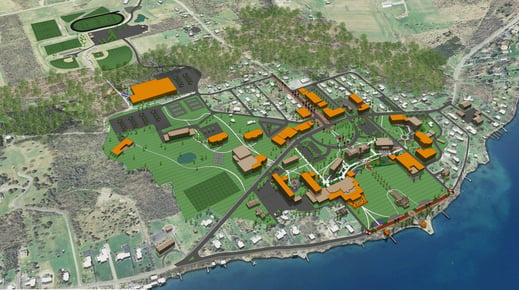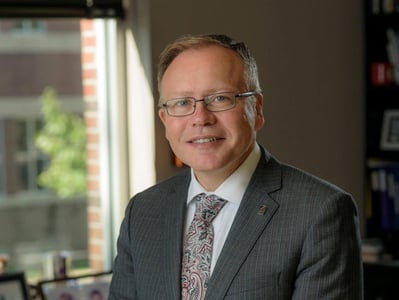
March 5 2019
Consider the incredible explosion of information that the internet and digital technology has wrought. Everyone with a smartphone now carries a library in his or her pocket. We collectively perform 1.2 trillion searches a year on Google alone—that’s forty thousand per second. More data has been created in the past two years than in the entire previous history of the human race.
The democratization of knowledge across our society has vast implications for the role of faculty, for the definition of teaching, and for the way we measure and assess student achievement. Make no mistake, trained professors are vital to the learning process in higher education, as they can guide a student’s journey from limited knowledge and awareness to understanding, application, discernment, and critical problem-solving; but the learner, not the teacher, exists at the center of the personalized-learning model. Universities were the keepers of knowledge for a long time, but we must now act as agile facilitators of that knowledge. Our ability to serve students in this capacity is completely dependent upon our ability to change how learning happens at our institutions.
Working together, life coaches, learning designers, and faculty in the new university will craft experiences within courses that allow for personalized instruction. A personalized approach is one where all students are moving through their own journeys of discovery, taking in and absorbing information and ideas based on their own learning strengths, with faculty as periodic caretakers and facilitators along that journey. This approach will not guarantee students’ success, but it will give them the best opportunity to present what they do know and understand. Each student experiments, innovates, tries, fails, learns, adapts, and ultimately masters areas of study, and then moves on. In this model, learning is an integrated, interconnected ecosystem where everything impacts everything else.
In support of the new roles of faculty and students alike in a personalized-learning model, learning spaces will change to be flexible, mobile, and integrated. Learning in the new university happens everywhere, because mobile technology (smart-phones, tablets, and other tools) allows students to engage more thoroughly in the learning process and move beyond the artificial constraints of a classroom. Learning spaces and places must break down a student’s isolation and connect him or her with his or her fellow students and the broad world of experience and knowledge through group orientation and collaborative problem-solving.
These types of learning spaces necessitate a high level of connectivity across campus. Learning happens everywhere, therefore access to learning must be ubiquitous. Classrooms, libraries, study areas, and the like become fused into one great learning space where students engage in the learning journey. In the new university, the most acclaimed approaches see the entire campus as one free-flowing learning space. Our pivoting institutions have approached personalized learning in a variety of ways.
Stay tuned for our next four blogs featuring case studies of Maryville University's Active-Learning Ecosystem, Dakota Wesleyan University's Learn Strong Program and High-Relevance Core, Spelman College's Metacognitive Study, and Marian University's Medical College Transformation.
Campus spaces are integral to learning, and campus leaders must be intentional about the creation, revitalization, and integration of space to promote a holistic student-focused experience. The Credo Master Plan is inclusive of the many perspectives on your campus, and gives voice to the constituents who will benefit most from its culmination: students, faculty, staff, and more. Find out what makes a Credo Campus Master plan different, and how it can take your campus--and students'--success to the next level.
Are you enjoying this blog series? If so, you can get the complete text behind the blog by ordering "PIVOT: A Vision for the New University." Go beyond excerpts and get the full story by ordering your copy today!
© Credo and www.credohighered.com, 2018. Unauthorized use and/or duplication of this material without express and written permission from this site’s author and/or owner is strictly prohibited. Short excerpts and links may be used, provided that full and clear credit is given to Credo, Credo Press, and www.credohighered.com with appropriate and specific direction to the original content. Please email info@credohighered.com for information on how to obtain a full copy of Pivot: A Vision for the New University or for permission to use excerpts from the book and/or blog series.
Related Blog Posts
Recent Posts
- Richard Dunsworth, J.D., To Receive 12th Annual Courageous Leadership Award December 16 2024
- Meet the 2024 Credo Values Award Recipients August 27 2024
- What is Executive Coaching, Really? June 25 2024
- Credo & The Constructive Dialogue Institute Announce A New Partnership For Higher Education Leadership Development March 7 2024
- Celebrating Women And Gender-Diverse Learners & Leaders February 28 2024
Categories
- Strategy
- Leadership
- Student Success
- Student Success & Retention
- Enrollment
- Pivot
- Strategic Planning
- Leadership Development
- News
- Strategic Enrollment
- Campus Planning and Architecture
- Moving the Needle
- Data
- Research
- Retention
- Campus Master Planning
- Enrollment & Financial Aid
- Academic Programming
- Campus Planning
- Thriving
- Admitted Student Research
- Architecture
- Finance
- Advising
- Admissions




